Sanitation Technologies
A Division Of Anderson Chemical Company
Meat & Poultry Industry
Stringent health standards necessitate specialized cleaner and a "complete" sanitation program to ensure food quality. Anderson has a full-line of cleaners/sanitizers and knowledgable service and field tech personnel to establish customized sanitation programs for our customers. Anderson's commitment is to assist our customers with the production of the highest quality food products.
Meat & Poultry Industry Info Sheets
Program Approach
Program Standards
When Anderson Chemical Company becomes involved in building a comprehensive sanitation program, it is extremely important to develop a common language, one that is understood by all levels within a food processing environment. We assist the customer in defining the areas of importance such as:
- Development of a sanitation Business Plan
- Defining current process through Anderson's Value Profile
- Assisting with the development of Sanitation Standard Operating Procedures (SSOP's)
- Master Sanitation Schedules
- Performing Visual Inspections of cleaned and sanitized surfaces
- Recommending and installing Sanitation Dispensing & Monitoring Equipment
- Defining Program Objectives
- Providing Written Service & Cost Reporting documentation following each service visit
- Development of a complete Sanitation Program Manual
- Proper Testing & Recording Programs
- Auditing Programs
Business Plan
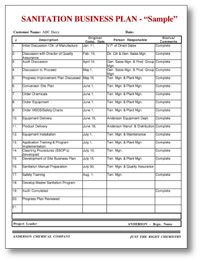 A successful sanitation program requires planning. Anderson Chemical Company assures success through a Business Plan Approach, which is in effect, a roadmap for the development and implementation of our sanitation programs. What general areas do we focus on?
A successful sanitation program requires planning. Anderson Chemical Company assures success through a Business Plan Approach, which is in effect, a roadmap for the development and implementation of our sanitation programs. What general areas do we focus on?
- We work to increase the staff’s sanitation competency.
- We closely monitor program performance and costs.
- We constantly look for opportunities to improve the program.
- We work to reduce waste.
-
We enhance employee training in areas of product application and safety.
- By developing a Business Plan which:
- Defines completion dates.
- Assigns individual responsibility.
- Monitors project status to completion
(see following sample plan)
What types of projects are included in the plan? The next section, Anderson's Program Standards, lays out the basics of a sound, comprehensive sanitation program. Beyond this initial checklist of critical components, is a whole world of potential projects, "unique" to the customer's operation. The nature and extent of these projects will depend on "how far management will want to take the program". Anderson's primary responsibility as a professional supplier of sanitation programs, is to show our valued customers how far they can go and help them to get there.
Value Profile
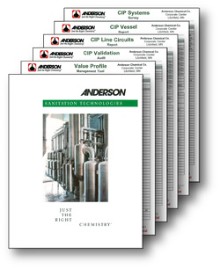 The Value Profile is a program management tool that allows the Anderson Territory Manager (technical representative for the account) to measure program progress. It aids the account review process by creating program benchmarks.
The Value Profile is a program management tool that allows the Anderson Territory Manager (technical representative for the account) to measure program progress. It aids the account review process by creating program benchmarks.
SSOP Development
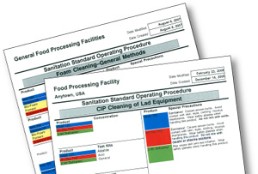
SSOP... a standard sanitation operating procedure, when well done is the vital how to of a good sanitation program. Collected here in one document, is all the basic information needed to clean and sanitize a piece of processing equipment or plant area. Ensuring that these critical documents are accurate and current, and that sanitation crew members are well trained in their application, is almost job #1 for a well run sanitation program.
Master Sanitation Schedule
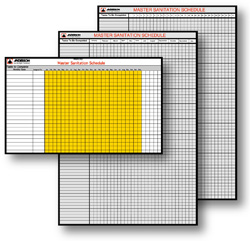 They say that in life, timing is everything. It is no different with a dairy plant's vital sanitation program -- "bugs wait for no one"! To insure unwanted microbes don't get the upper hand in your operation, timely performance of tasks by the sanitation team, is critical. A closely monitored master sanitation schedule, helps insure that time is not on the bug's side.
They say that in life, timing is everything. It is no different with a dairy plant's vital sanitation program -- "bugs wait for no one"! To insure unwanted microbes don't get the upper hand in your operation, timely performance of tasks by the sanitation team, is critical. A closely monitored master sanitation schedule, helps insure that time is not on the bug's side.
Visual Inspections
Visual Inspections of Cleaned and Sanitized Equipment
- Inspections must be competed on a routine basis, in a dry condition to confirm cleanliness.
- A written inspection report is required upon completion.
Dispensing & Monitoring Equipment
Sanitation Dispensing & Monitoring Equipment
In this age of electronic technology, the ability to provide a more consistent and effective sanitation program is a reality. Quality dispensing & monitoring equipment help minimize labor and program costs, while reducing the impact on process equipment integrity through chemical excursions.
Define Objectives
Define Program Objectives
Program Improvement Objectives
Anderson’s Service Specialists will assist with defining the long and short term planned projects with time lines towards completion.
Service & Cost Reporting
Written Service & Cost Reporting
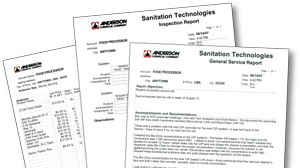 Our experienced Service Specialists will compile accurate and professional written documentation of their observations, solution tests, plant activities, and recommended improvements completed during the service visit. An exit meeting will be scheduled to review these findings.
Our experienced Service Specialists will compile accurate and professional written documentation of their observations, solution tests, plant activities, and recommended improvements completed during the service visit. An exit meeting will be scheduled to review these findings.
Program Manual
Development of a complete Sanitation Program Manual
A quality sanitation program has many components, so its nice to have a place where most of those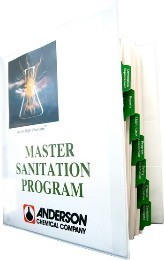 components come together for easy access and overview. That place is our Sanitation Program Manual. It's purpose is to organize the many parts of the program into one well layed out document, so that most of your sanitation program content is literally "at your fingertips".
components come together for easy access and overview. That place is our Sanitation Program Manual. It's purpose is to organize the many parts of the program into one well layed out document, so that most of your sanitation program content is literally "at your fingertips".
Testing & Recording
Proper Testing & Recording Programs
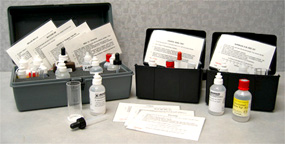 Chemical tests are the "technical eyes" of professional sanitarians and their teams. These program checks tell them what's going on at the unseeable molecular level, and guide them in making proper adjustments so that good results are assured. A well-designed, user friendly test, greatly aids this critical activity.
Chemical tests are the "technical eyes" of professional sanitarians and their teams. These program checks tell them what's going on at the unseeable molecular level, and guide them in making proper adjustments so that good results are assured. A well-designed, user friendly test, greatly aids this critical activity.
Anderson’s trained professionals work toward
- Review & maintain test kit care
- Reagent code dates
- Proper titrants, bottles & tips/droppers
- Proper test cards/procedures
- Review contents of the test kit
- Unwanted items
- Cleanliness
- Proper techniques in sampling and testing
- Proper sample points
- Proper times to sample
- Proper use of the chemical testing instructions
- Review procedure requirements
- Corrective actions based on results
- Setting proper ranges for usage
Auditing
Auditing Programs
After our comprehensive sanitation program is up and running and has even had some time for "fine tuning", a good overall check-up should be given. This check-up we call an "audit" and it is a vital part of the total program. It is usually done annually, but consideration is also given for a particular plant's production cycles and changes as to when it is scheduled.